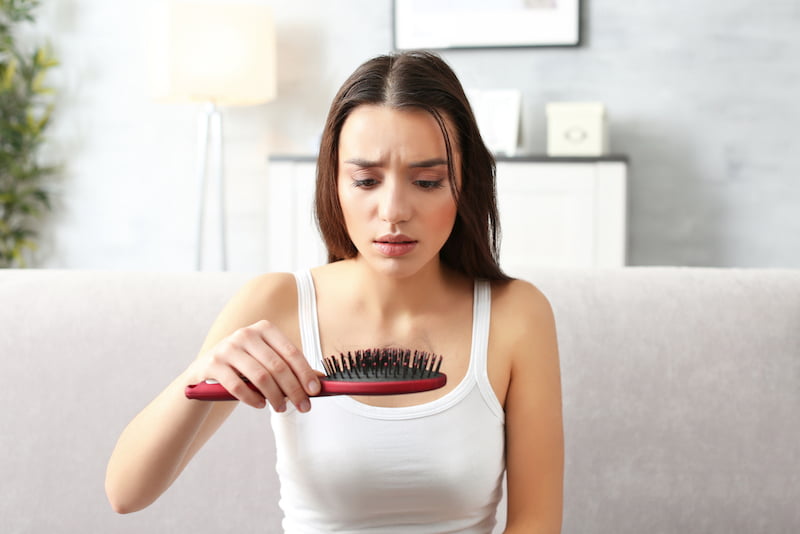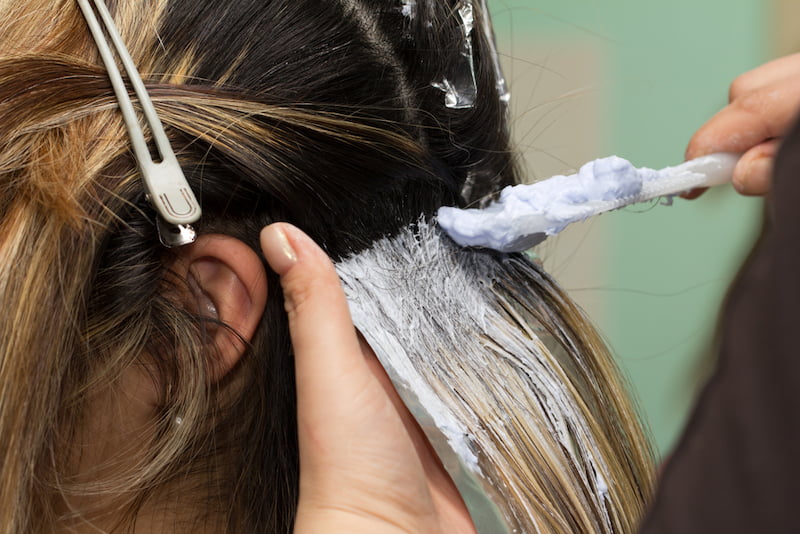
How Long Does It Take For Hair To Grow?
Ever wondered how long does it take for hair to grow at a certain pace or how to achieve those luscious, long locks you’ve always dreamed of?
You’ve come to the right place! Let’s dive into the fascinating world of hair growth, debunk common myths, and unveil the secrets to promoting healthier, faster-growing hair.
Ready to transform your mane? Let’s get started!
Short Summary
-
Take control of your hair growth journey by understanding the science behind it and taking care of genetics, age, nutrition & scalp health.
-
Establish a healthy routine with regular trims, gentle products & limited heat styling for strong results.
-
Fuel your journey with balanced diet & supplements while managing stress levels to achieve beautiful hair!
Understanding Hair Growth Rates
Have you ever found yourself staring at the mirror, willing your hair to grow faster after a bad haircut?
Don’t worry, we’ve all been there.
Understanding hair growth rates is essential to set realistic expectations and determine the best ways to support your hair growth journey.
I LOVE MY HAIR NOW
FullyVital hair serum and hair vitamins made tremendous improvements in my hair. I truly love my hair now.
Meg S.,
So, how long does it take for hair to grow?
On average, hair grows about 0.3 to 0.4 mm a day, which equates to impressive growth rates of 0.1 inches per week, 0.5 inches per month, and up to 6 inches per year.
The hair growth process is truly remarkable, with new cells constantly being created in the hair bulb that stick together and harden to form an entire hair strand.
Stiffened cells connect to the hair from beneath and push it up and out through the skin.
This contributes to normal hair growth and helps your hair grow.
Various factors can affect hair growth, such as genetics, age, nutrition, and scalp health.
Knowing your hair’s natural growth cycle and nourishing it with the right nutrients can help you make the most of your hair growth journey.
Weekly Growth
While we all wish our hair could grow inches overnight, the reality is that weekly hair growth is quite minimal, averaging around 0.1 inches.
Although it may not seem like much, every little bit adds up over time.
Factors like genetics, age, nutrition, and scalp health can influence weekly hair growth, so it’s essential to take care of these aspects to encourage faster growing hair.
Monthly Growth
When it comes to monthly hair growth, you can expect an average growth of around 0.5 inches, with individual variations.
That’s a significant amount of progress in just one month!
By maintaining a healthy hair care routine and focusing on the factors influencing hair growth, you’ll be on your way to achieving long hair in no time.
Yearly Growth
Yearly hair growth averages around 6 inches, but it can vary based on factors such as genetics and health.
Medical issues like thyroid imbalance, anemia, or autoimmune disorders can negatively affect hair growth.
To promote hair growth, follow a consistent hair care routine, eat a nutritious diet, and manage your stress levels, all of which can make your hair grow.
The Science Behind Hair Growth
The hair growth cycle consists of four phases: Anagen, Catagen, Telogen, and Exogen.
Each hair on your scalp goes through this cycle, with the duration ranging from 2 to 6 years.
Understanding these phases is crucial, as they determine the rate of hair growth and help you develop strategies to boost your hair’s potential.
Various factors, such as hormonal changes, health issues, and genetics, can disrupt the hair growth cycle.
By taking care of these aspects, you can ensure a healthy hair growth cycle and achieve your desired hair length.
Let’s dive into each phase and learn how they contribute to hair growth. We'll review how long does it take hair to grow after reviewing these cycles.
Anagen Phase
The Anagen phase is the active growth phase, lasting anywhere from 2 to 7 years.
During this phase, the hair follicle is actively growing and producing new hair cells.
This is the longest phase of the hair growth cycle, and taking advantage of it is key to maximizing your hair growth potential.
A healthy scalp, proper nutrition, and stress management can all contribute to a longer and more productive Anagen phase.
Catagen Phase
The Catagen phase is a transitional phase, lasting around 2-3 weeks. During this phase, hair growth stops, the hair follicle shrinks, and the root of the hair is separated from the blood supply.
This resting phase is crucial for the hair growth cycle, as it allows the hair follicles to prepare for the next growth phase.
Telogen Phase
The Telogen phase, or the resting phase, as it is also referred to, can last anywhere from 2-3 months.
This length of time is remarkable. During this phase, the hair follicles rest and prepare for a new growth cycle, eventually shedding the old hair.
Proper scalp care and stress management can help maintain a healthy Telogen phase, allowing your hair to grow stronger and healthier.
Exogen Phase
The exogen phase is the shedding process of hair. This is a natural process where approximately 100 hairs are lost every day.
This phase lasts only a few days, so don’t worry. The shedding of old hair allows for the growth of new hair, completing the hair growth cycle.
Maintaining a healthy scalp and hair care routine can help ensure a smooth transition from the Exogen phase back to the Anagen phase, promoting continuous hair growth.
So how does does it take to grow hair? Read on.
Factors Influencing Hair Growth
As mentioned earlier, factors such as genetics, age, nutrition, and scalp health can influence hair growth rates and overall hair health.
By understanding these factors, you can take the necessary steps to support your hair growth journey and achieve the luscious locks you’ve always desired.
It’s important to remember that each person’s hair growth journey is unique, and what might work for one person may not necessarily work for another.
Therefore, it’s essential to be patient, try different approaches, and find the best combination of factors that work for you in promoting healthy hair growth.
Genetics
Genetics play a significant role in determining hair growth rates and hair type.
For instance, the activation of the Lhx2 gene in hair follicles has been shown to trigger the growth phase, allowing for the formation of hair.
Genetics also plays a major role in hair loss, regardless of gender.
While you can’t change your genetics, you can still take steps to optimize the other factors that contribute to hair growth.
This includes eating a balanced diet, exercising regularly, and reducing stress. Additionally, there are additional benefits.
Age
Age can affect hair growth rates, with hair growth slowing down as we age.
Hair growth is at its peak between the ages of 15 and 30 before gradually slowing down. As people get older, some follicles cease functioning entirely.
Despite the impact of age on hair growth, adopting a healthy hair care routine and maintaining proper nutrition can help support hair growth at any age.
Nutrition
A balanced diet and proper nutrition are essential for healthy hair growth. Consuming foods rich in protein, biotin, iron, vitamin C, vitamin D, vitamin E, zinc, and omega-3 fatty acids can help encourage healthy hair growth.
If you’re unsure about your nutritional needs, consult a healthcare professional or a registered dietitian to develop a customized meal plan that supports your hair growth goals.
Scalp Health
Maintaining a healthy scalp is crucial for promoting hair growth and preventing hair loss.
A healthy scalp has a balanced pH level, is free of dead skin cells, and has adequate blood circulation.
Using scalp oils or massaging essential oils into the scalp can help maintain a healthy scalp and promote hair growth.
Ensuring proper scalp care, along with a nutritious diet and stress management, can significantly contribute to healthy hair growth.
Tips for Encouraging Hair Growth
By now, you’ve gained a deeper understanding of the factors influencing hair growth and the science behind it.
Let’s put that knowledge into action by exploring some tips for encouraging healthy hair growth.
A proper hair care routine, maintaining a balanced diet, taking supplements, and managing stress levels can all contribute to achieving the luscious locks you desire.
Remember, patience is key when it comes to hair growth. It takes time for your hair to grow, and results may vary from person to person.
Stay consistent with your hair care routine and continue to nourish your hair with the right nutrients, and you’ll be on your way to achieving your hair growth goals.
Proper Hair Care Routine
A proper hair care routine includes regular trims to prevent split ends and breakage, using gentle hair products that don’t strip your hair of its natural oils, and avoiding excessive heat styling, which can cause damage and hinder hair growth.
Additionally, keeping your scalp clean and free of dead skin cells and product buildup is essential for promoting hair growth.
Consider incorporating a scalp scrub or using a scalp massager to stimulate blood circulation and support healthy hair growth.
Diet and Supplements
Consuming a balanced diet and taking supplements such as biotin, keratin, and omega-3 fatty acids can support hair growth.
Ensuring that you’re getting enough of these essential nutrients can help provide your body with the building blocks it needs for healthy hair growth.
In addition to a balanced diet, consider taking FullyVital hair growth vitamins or the FullyVital hair growth serum to further support your hair growth journey.
Stress Management
Managing stress through relaxation techniques and exercise can help prevent hair loss and promote healthy hair growth.
Stress can cause hair to prematurely enter the telogen (resting) phase, leading to hair loss, so managing your stress levels is crucial for healthy hair growth.
Consider incorporating relaxation techniques such as deep breathing, meditation, or yoga into your daily routine to help manage stress and support hair growth.
Common Hair Growth Myths Debunked
Now that we’ve discussed the science and factors influencing hair growth, let’s debunk some common hair growth myths.
You might have heard that frequent trims can accelerate growth or that shaving causes thicker hair regrowth. However, these myths are simply not true.
Frequent trims do not boost growth, although they can help maintain healthy hair by preventing breakage and split ends.
Shaving does not result in thicker hair regrowth, and hair growth is not influenced by the phases of the moon.
By focusing on the accurate information we’ve shared in this blog post, you can take the right steps towards achieving your hair growth goals.
Summary
In conclusion, understanding the science behind hair growth, the factors that influence it, and adopting the right hair care routine, diet, and stress management techniques can help you achieve the luscious locks you’ve always wanted.
Remember to be patient and consistent with your efforts, as hair growth takes time and varies from person to person.
Keep nurturing your hair and follow the tips shared in this blog post, and you’ll be on your way to healthier, faster-growing hair.
Frequently Asked Questions
How can I speed up hair growth?
Boost your hair growth by getting frequent trims, eating a balanced diet, taking vitamins, washing your hair less often, avoiding bleach and heat styling, brushing regularly, and protecting hair from damage.
These simple steps can help you achieve the hair of your dreams. With a little bit of effort, you can have the luscious locks you’ve always wanted.
Taking care of your health is important, as the human head has between 80,000 to 150,000 hairs. It takes energy to grow hair.
Can hair grow 1 inch a month?
On average, hair tends to grow between 0.5 and 1 inch per month, depending on the person. With healthy hair and scalp, it is not unusual for hair to grow as little as a centimeter or up to an inch in a month.
How much does hair grow in 2 weeks?
On average, hair grows about half an inch per month, so in two weeks, you can expect your hair to grow around 4.2 mm or one-quarter of an inch.
What are the four phases of the hair growth cycle?
The hair growth cycle is made up of four distinct phases: Anagen, Catagen, Telogen, and Exogen. Each phase plays a vital role in healthy hair growth.
What is a proper hair care routine for promoting hair growth?
Taking proper care of your hair is key to encouraging growth; make sure you get regular trims, use mild hair products, and limit heat styling to maintain healthy hair.
How long does it take for hair to grow back?
If you have experienced hair loss or significant thinning, then regrowing hair must be done systematically.
It's important to use multiple products to stimulate hair growth so that the dormant hair follicle can wake up and start to grow hair again.
So how long does it take hair to grow back? This process can take at least 3 months to see initial regrowth in the form of baby hairs.
Expect to see more significant hair growth in 6 months.







